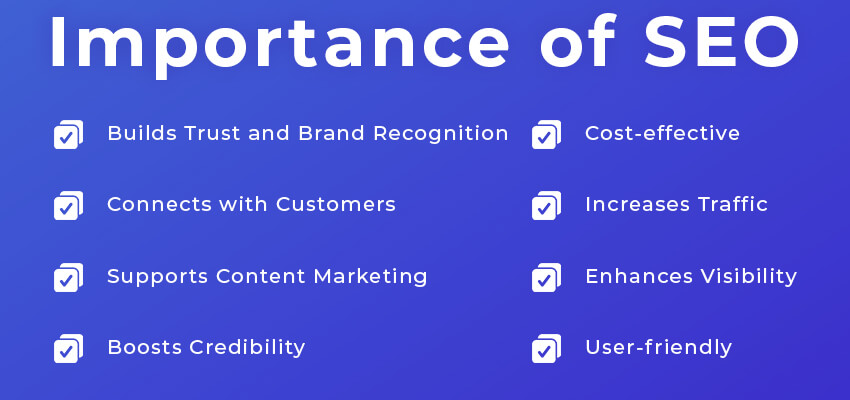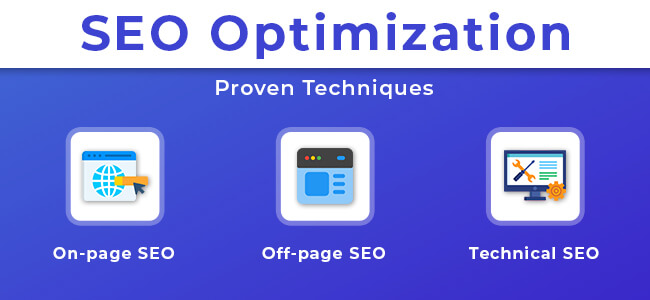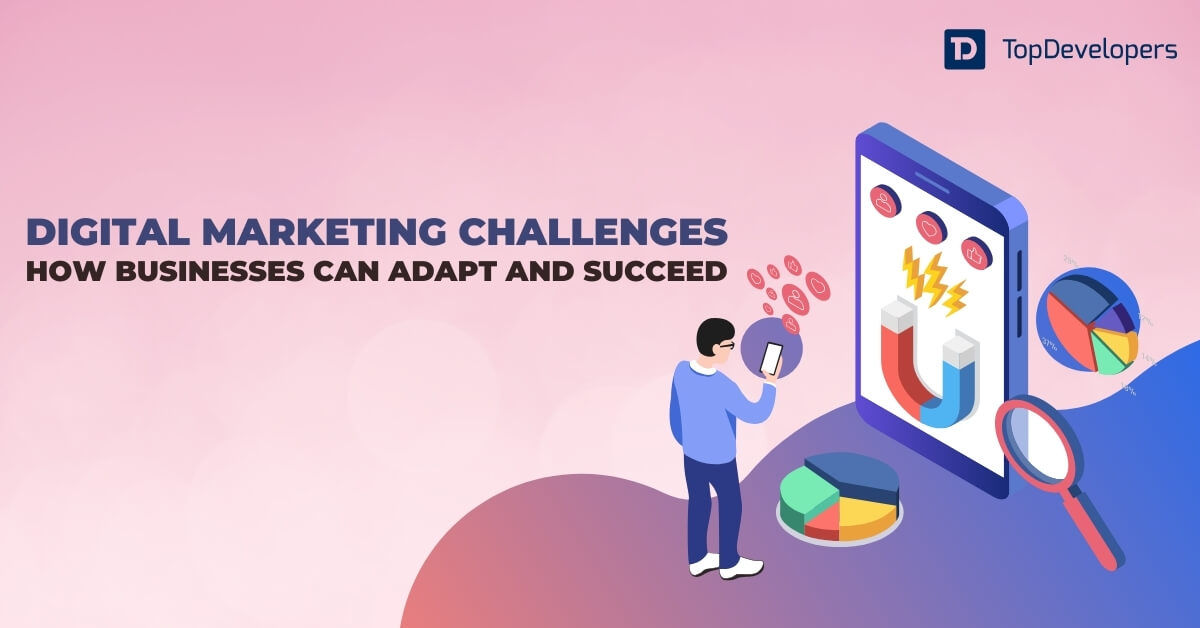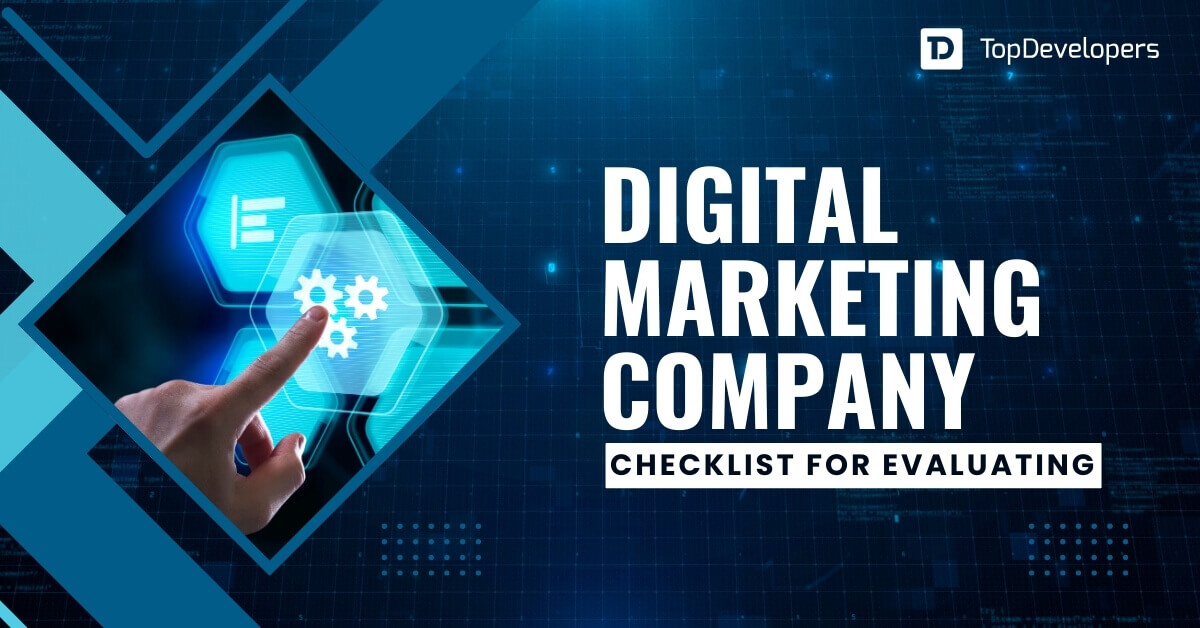
Having a strong online presence is crucial for any business. Especially when you are competing with many similar ones in your niche industry, you can choose to create a website for your online presence but only the development of the website won’t be enough to get your business noticed, your website must stand out.
Search Engine Optimization (SEO) is a part of digital marketing services and strategy that optimizes websites for search engines like Google and Bing. An SEO-optimized website ranks at the top of the search engine result page (SERP), increasing its visibility and traffic.
Interested to learn more about Search Engine Optimization (SEO) and how SEO works? The blog is a must-read.
SEO is significant in creating brand awareness, attracting new customers, and increasing conversions for your website and business. Many businesses, start-ups to enterprises, hire professional SEO experts.
Whatever your path, SEO is important for the success of your websites and digital businesses. So, let us deep dive into why SEO is important for business, and how it can significantly impact your online success.
Table of Contents
What is Search Engine Optimization (SEO)?
Search Engine Optimization (SEO) is the digital marketing practice of optimizing websites to improve their visibility and ranking organically in search engine results. SEO
includes-
- On-Page SEO
- Off-Page SEO
- Technical SEO
What are the main Elements of SEO?
Your page will rank on Google only if it meets its criteria. The Google search depends on the following five factors to evaluate a website:
- Relevancy
- Quality
- Usability
- Context
- Meaning
To ensure that you tick on the above 5 factors, you need to do all the elements of SEO the right way.
For example, businesses pay more attention to designing websites and publishing content. If they are ignoring the technical SEO, then the poor-performing website will never rank on search engines such as Google.
In another scenario, if technical SEO is done right, but the content lacks quality and relevancy, even then you will not rank as well.
So, you see, each factor contributes to SEO importance in getting your website rank on SERP.
Keyword research and planning
Keyword research is the process of identifying keywords relevant to your business niche and services. The keywords are the terms that your target audience searches for and the goal of this process is to create content that ranks your website for the same keywords.
Plus, with the right keyword strategy, you bring in more visitors to your website, which could lead to more sales and revenue. The key to creating the perfect keyword plan is to focus on keywords with high (average) search volume and less competition.
Another factor that you should focus on during keyword planning is the user intent. You need to create the right content type based on the user intent. For example, if the user intent is informational for a keyword and you are presenting a landing page on that keyword, the purpose is lost.
So always focus on what the user is looking for or expecting from a particular keyword and then plan what content you will be targeting it with.
Content strategy
Content strategy is the process of creating and publishing content that resonates with your audience and helps you rank your blogs and web pages on Google. An ideal content strategy is one that takes the user through every step of the buyer funnel, starting with TOFU, MOFU, and BOFU content.
Your content strategy is strong if it addresses your users’ pain points, offers a solution, and aligns with your business goals.
The best way to start with content strategy is to
- identify your goals,
- understand your users
- Analyze your competitors
- Do keyword research
- Identify the best content types
- Find the best platforms to publish your content
Please note that content auditing and improvement are as important as creating new content. It helps you add value to your old content and opens opportunities for more impressions and traffic.
On-page & off-page SEO
Off-page SEO refers to the activities that happen outside of your website. Examples include backlinks, guest postings, press releases, directory submissions, social bookmarking, forums, brand mentions, and more.
These activities on third-party websites help you build brand authority. In a way, it improves a website’s search engine rankings, visibility, and reputation. Your off-page SEO actions are a cue to the Google search engine that your website is trustworthy.
On the contrary, on-page SEO refers to the activities you do on the website to improve its SERP ranking and user experience. On-page SEO involves optimizing your website pages and blogs as per brand guidelines and SEO principles to drive more traffic. On-page SEO includes meta tags, visuals, alt text, internal linking, schema markup, and others.
For your website to rank on Google and to build a strong online presence, you need to keep both on-page and off-page SEO in check.
Local SEO
Local SEO is a type of search engine optimization (SEO) that helps businesses show up higher in search results for local searches. So, if someone in your area is looking for a business like yours, local SEO can help them find you.
For example, if a person in California searches for the best bakery in California, your website will show up on the top page. This can happen only when you optimize your website with keywords specific to your location. In this case, the “best bakery in California” keyword on your website will push it to the top on SERP when the user searches for the same.
Another way to do local SEO is to list your website in online directories. Please ensure that your business name, logo, and contact details are the same across all directories.
Plus, you can also register on Google Business. This will show your business profile on the top page when someone is looking for your services in your niche. Please ensure that you have the correct name, contact details, photos, address, and website on the Google Business profile.
TopDevelopers.co have curated a list of top-performing Local SEO agencies that can help you rank higher and attract more local customers.
Technical SEO
SEO isn’t about only keywords, meta titles, backlinks and alt text. Technical SEO plays a crucial role in getting your website ranked higher on SERP.
Technical SEO is all about optimizing the technical aspects of your website to make it easier for search engines to find, understand, and rank your content. Its importance is evident from the fact that it is the foundation upon which other SEO efforts build.
Technical SEO involves website speed, performance, mobile optimization, site architecture, structured data, crawlability, and spam scores. If these elements are not in check, then you are never going to rank on Google, no matter how much you focus on keyword research and content strategy.
What is the Importance of SEO for your Website?
The significance of SEO in website is widespread. It is one of the most noteworthy aspects of ranking your website on search engines organically. Let us help you understand the importance of search engine optimization deeply.
SEO Builds Trust, Credibility, and Brand Recognition
The importance of SEO in business is inevitable, as it helps you build your brand and establishes your authority in the niche. The goal of search engine optimization is not only to drive traffic but also to build your online brand image.
By targeting keywords relevant to your users and addressing their problems, Website SEO assists you in gaining user trust. Off-page SEO activities give your brand the credibility it deserves. The technical SEO ensures your users have a seamless website experience, which also adds to the trust factor. Plus, on-page SEO ensures that you are producing quality and context-relevant content to show your niche authority, educate users, and promote your products.
Imagine this: You need to find a reliable plumber. You search online and a local plumber consistently shows up at the top of the search results, with great reviews and helpful articles about plumbing issues. This builds trust and establishes them as a credible source. You’re more likely to consider them for the job because of their strong online presence.
SEO Connects You with Customers Throughout the Buyer’s Journey
The importance of search engine optimization in content marketing is undeniable, as it bridges the gap between you and your customers.
At the awareness stage, SEO helps by ensuring that your website appears in searches related to user problems. It can be blogs, guides, and tutorials that attract your users to your website.
At the next stage, the user fully understands his problem and is now looking for potential solutions. The SEO here supports you by ranking high for keywords related to the specific products or services that the user might search for.
When it’s time for a decision, SEO positions your website and promotes the products as the ideal solution to the user’s problem. It does so by narrating unique selling points (USPs), showcasing client testimonials, and publishing case studies.
Looking for the best SEO companies to boost your business visibility fast?
Supports Content Marketing
SEO helps in creating and optimizing content for your websites. It ensures that the content is helpful for your targeted audience by following a few guidelines like simple content, readability, and content organized in bullets and optimized for keywords. Thus, SEO supports your content marketing strategies too. Businesses should update the website content periodically to optimize it for SEO as it can help to inform your targeted audience regarding your business and services.
Boosts Credibility
Search engines like Google rank high-quality and relevant websites on top. So, if your website is optimized for SEO, it will rank higher, and site visitors will consider it more trustworthy and credible. So, ensure your website has relevant keywords and a high loading speed to boost its ranking in search results to increase your website’s credibility.
Cost-effective
If you choose to do the SEO on your own while avoiding a PPC campaign, SEO will cost you nothing. Ensure your website content is useful for the users as search engines crawl and promote useful content organically.
You can also indulge in some competitor research and check the sites that rank high on search engines for your relevant queries. You can see how they put the content and optimize your website accordingly.
Higher Traffic
The purpose of SEO is to optimize your websites for search engines. However, another major aim of SEO is to get more visitors to the website. More traffic means more leads and increased chances of conversions. So, if you have done your SEO right, you can get more customers for your business.
Increase Visibility
62% of consumers search online to learn about a new product or service. So, if your website is optimized for SEO, it will rank on top of search engines. Thus, it is a great way to boost your business visibility among customers.
User-friendly
Google-like search engines focuses on finding and delivering the best possible and relevant information for its users. Their search ranking algorithms ensure to rank of those websites that not only deliver relevant content but also offer friendly user experiences.
So, websites that are mobile-friendly and offer fast loading speed and performance stand out from other websites. SEO service optimizes your overall website for backlinks, content, usability, speed, etc.
How To Optimize Your Website For SEO?
Here is a detailed guide to help you optimize your website for SEO.
On-page SEO
Keyword research: Identify relevant keywords that align with your user behavior, services, and business niche.
Content: Create content pillars and strategy targeting your keywords. Use multiple content formats and types to experiment with which works best for your preferred digital platforms.
Meta Titles & Descriptions: Do not forget to optimize your web pages’ meta title and description. Ensure that it’s within the character limit and includes the keyword.
Internal Linking: Link your web pages, blogs, case studies, and guides to other relevant pages to enhance the user experience and distribute the link equity.
Image Optimization: Add relevant images and optimize their file size and alt tags with descriptive keywords. Furthermore, you can add attractive infographics where relevant.
Off-Page SEO
Link building: Earn backlinks from reputed sites that enhance your website’s visibility and signal search engines about the website’s credibility.
Guest posting: Look for guest posting opportunities on reputable third-party websites to earn backlinks as well as build website authority.
You can also try local SEO, forums, directories, press releases and other types of off-page SEO strategies to promote your website.
Technical SEO
Website Speed: Always ensure your website loads quickly on all devices. You can use tools like Google PageSpeed Insights to identify issues and improve your page speed further.
Mobile-friendliness: Check the mobile compatibility of your website as a significant portion of searches now come from mobile devices.
URL Structure: Use clear and concise URLs that incorporate your target keywords.
Along with these, you also need to monitor and optimize the website’s crawalability, indexing, HTTP status code, robot directives, canonicalization, site structure and navigation.
By following these tactics you can create an effective SEO strategy that will boost your website’s rankings and bring in more traffic.
The Vital Role of SEO in Website Success!
Why is SEO important for any website? We hope the blog answered the question well. Optimizing your websites for search engines has major benefits for long-term growth. If you invest in SEO, you can build credibility and trust for your brand. SEO can be done right with keen attention to the fundamentals and following the best practices. Or you can seek professional help from an SEO or digital marketing expert.
Frequently Asked Questions Regarding SEO for Website
Can I Do SEO Myself?
Yes, it is possible to do SEO on your own. You can learn SEO from many websites that offer the courses or the knowledge for free. For example, SEO learning center, Moz Academy, etc. However, if you want excellent results, seeking professional help from a reliable SEO company is recommended.
What is On-page SEO?
On-page SEO involves optimizing the content on your website for users and search engines. It involves-
- Optimizing Your Title Tags
- Optimizing Your Meta Description
- Optimizing Your Page URL
- Optimizing Your Heading Tags
- Optimizing Your Images
What is Technical SEO?
Technical SEO is ensuring that your site can be crawled and indexed by search engines. It involves-
- Setup Google Search console
- Check your Robots.txt file
- Optimize site speed
- Setup HTTPS
What are some of the best SEO audit tools?
Nowadays, there are many SEO tools available to help business owners optimize their websites to rank higher on search engines. The SEO audit tools are both free and paid. Here are some of the best SEO audit tools for websites– SEMrush Site Audit, Ahrefs Site audit tool, Google Search Console, etc.
 Avantika Shergil
| May 30, 2024
Avantika Shergil
| May 30, 2024
Avantika Shergil is a technology enthusiast and thought leader with deep expertise in software development and web technologies. With over 8 years of experience analyzing and evaluating cutting-edge digital solutions, Avantika has a knack for demystifying complex tech trends. Her insights into modern programming frameworks, system architecture, and web innovation have empowered businesses to make informed decisions in the ever-evolving tech landscape. Avantika is passionate about bridging the gap between technology and business strategy, helping businesses build customized software and website, and understand about different tools to leverage effectively for their ventures. Explore her work for a unique perspective on the future of digital innovation.








